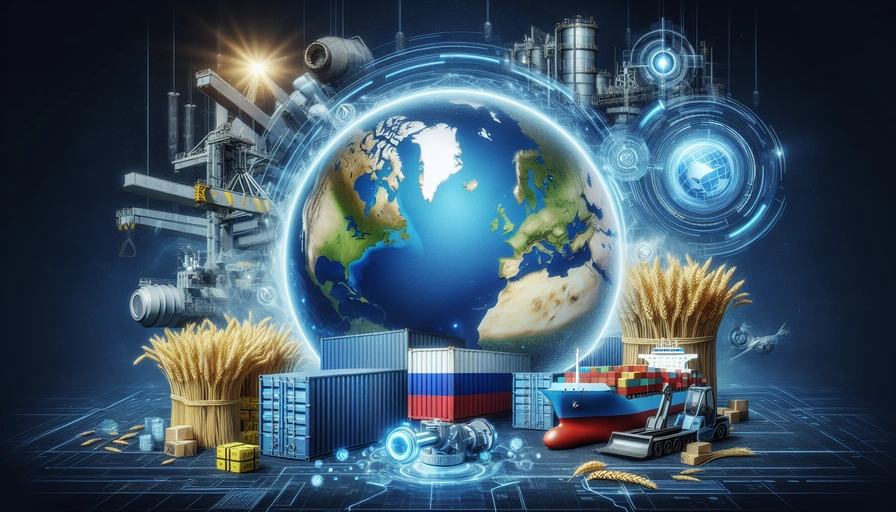The ongoing conflict between Russia and Ukraine has significantly impacted trade relations between the two countries. Here are some key developments and insights into the current situation:
- China-Russia Cooperation: China and Russia’s cooperation has expanded significantly over recent decades, encompassing various sectors and yielding substantial results. Bilateral trade reached a record USD 244.819 billion in 2024, a 1.9% increase compared to 2023. This cooperation includes 156 key projects initiated with the Soviet Union, ranging from agricultural products to automobiles. Despite global challenges, practical cooperation between China and Russia continues to grow in both quantity and quality. Chinese Foreign Minister Wang Yi stated that China and Russia can overcome obstacles in their cooperation, regardless of external pressures. Wang Yi’s visit to Russia (March 31 – April 2) involved discussions on high-level contacts, bilateral relations, and international issues, including the situation in Ukraine.
-
Trump Announces End to US Military Aid for Ukraine: On April 18, 2025, Donald Trump stated that the USA will no longer provide military support to Ukraine. This decision could have significant implications for the ongoing conflict and the broader geopolitical landscape.
-
Putin Suggests Ukraine War Truce Based on Current Front Lines: On April 22, 2025, Putin proposed ending the Ukraine war along current front lines. This proposal involves Russia dropping claims to parts of four Ukrainian regions still under Kyiv’s control. In exchange, Ukraine would halt military efforts to reclaim occupied territories, and Russia would pause its offensive. The US suggested a European peacekeeping force to monitor a ceasefire in a demilitarized zone. Key concessions sought by Russia include recognition of Crimea’s annexation and assurances against Ukraine joining NATO.
-
Russia Backs Black Sea Grain Deal Resumption, Seeks Acceptable Terms: Russia supports resuming the Black Sea Initiative but seeks a mutually acceptable format. This was a priority discussion topic in Riyadh, according to Russian Foreign Minister Sergey Lavrov. Lavrov stated that Russia’s position is to ensure predictable grain and fertilizer markets, preventing exclusion and ensuring food security in African nations.
-
US-Russia Talks in Riyadh: Russia and the US held 12-hour talks in Riyadh, Saudi Arabia, focusing on Black Sea shipping safety and the Ukraine conflict. The meeting, initially described as “technical consultations,” was the longest Russia-US dialogue since the start of the Ukraine crisis. The US views the meeting as preparation for future negotiations on Ukraine’s territorial division and future peace terms. The talks were held in strict secrecy; journalists were removed from the hotel, and all photography and videography were prohibited.
-
Russia Denies New Black Sea Grain Deal Negotiations: No specific discussions regarding new Russia-USA negotiations on the Black Sea Initiative are currently underway, according to Senator Grigory Karasin, a member of the Russian delegation at talks in Riyadh, Saudi Arabia. The Black Sea Initiative, signed July 22, 2022, by Russia, Turkey, Ukraine, and the UN, facilitated Ukrainian grain, food, and fertilizer exports via the Black Sea from three ports, including Odessa. Russia withdrew from the initiative in July 2023, citing the Ukrainian regime’s use of the humanitarian corridor for attacks on Russian vessels and coastal infrastructure, and the failure to fulfill promises regarding Russian agricultural exports.
-
China to Boost Russian Natural Gas Imports in 2025: China plans to increase natural gas purchases from Russia in 2025. The increase will involve either using the Power of Siberia 2 pipeline or boosting LNG imports. Existing pipeline capacity through Kazakhstan is insufficient, making expansion costly. Alternative transit routes through Mongolia are under consideration. China is the largest consumer of Russian energy resources. Russia’s gas and oil supplies to China are increasing.
-
China and Russia Strengthen Energy Ties: China’s Vice Premier, Ding Xuexiang, affirmed the importance of energy cooperation with Russia. He stated that China and Russia are “good neighbors, inseparable, and true friends.” The relationship between China and Russia is described as mature, stable, and strong, guided by the leadership of Xi Jinping and Vladimir Putin. China is committed to deepening mutually beneficial energy cooperation with Russia to ensure national energy security. Energy cooperation between China and Russia is a crucial foundation of bilateral relations and contributes to global energy security. Energy trade between Russia and China accounts for over one-third of their total bilateral trade volume. Large-scale energy projects between the two countries are progressing steadily, expanding cooperation and supporting the development of their comprehensive partnership.
In summary, the trade relations between Russia and Ukraine are heavily influenced by the ongoing conflict and the broader geopolitical landscape. While the US has ceased military aid to Ukraine, Russia and China continue to strengthen their economic and energy ties. The Black Sea Initiative remains a contentious issue, with ongoing discussions and negotiations aimed at ensuring safe navigation and preventing the use of commercial vessels for military purposes. The future of Russia-Ukraine trade will depend on the resolution of the conflict and the ability of both countries to navigate the complex international dynamics.

